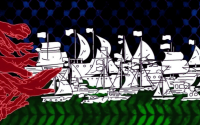Timothy Garton AshFebruary 21 2008
When, in the course of human events, it becomes necessary for one people to dissolve the political bands that have connected them with another ... they will do so only solemnly swearing to respect in every particular the conditions of the EU, the OSCE, Nato, the International criminal tribunal for the former Yugoslavia, and the comprehensive proposal of the UN special envoy, Martti Ahtisaari, "including through priority adaptation of the legislation included in its annex XII". The American colonies in 1776 and Europe's colony in 2008: compare and contrast.
Amid all the kerfuffle around Kosovo's declaration of independence, few have paused to note what an extraordinary document it is. It is so hedged about with conditions, obligations and reservations, many of them concerning protection for the remaining Serbian minorities, so replete with commitments to consult, honour and obey the province's international patrons, that it is also a declaration of dependence. Its last paragraph begins: "We hereby affirm, clearly, specifically and irrevocably, that Kosovo shall be legally bound to comply with the provisions contained in this declaration, including, especially, the obligations for it under the Ahtisaari plan" (my italics). You can almost hear the western adviser dictating over the Kosovan draughtsman's shoulder. This is less a case of "with one bound, Kosovo was free" than "with one bound, Kosovo was bound".
The reality on the ground will, of course, be rather different from the fine words on paper. The Kosovan Albanians have taken an important stride towards self-government. They had something to celebrate on the streets of Pristina last Sunday night. Their history textbooks, even those produced with EU subsidies, will tell a glorious though mythical story of centuries of national struggle culminating on this day. I would not like to be a Kosovan Serb living in one of the enclaves south of the river Ibar in the years ahead. I mourn for those beautiful Serbian monasteries, at Decani, Pec and Gracanica, that will now, more than ever, be islands in an alien sea.
The position of the Serbs north of the Mitrovica bridge over the river Ibar is a different story. Despite Nato's temporary closing of the border between them and Serbia, after the burning of two frontier posts by a local mob, the reality of their daily social, economic and cultural integration with Serbia will continue. De facto, Kosovo is already partitioned. And so it will surely remain until, when Kosovo and Serbia are both eventually members of the EU, it may gradually aspire, probably over a span of decades rather than years, to a situation comparable with that of Belgium: a country formally united, in practice largely divided, but with peace and freedom for its citizens secured in a larger framework. Indeed, if things go well in Europe's south-east and badly in its north-west, Belgium and Kosovo may yet converge: the Balkanisation of Belgium meets the Belgianisation of the Balkans.
The unique European context does make this story different from that of most would-be breakaway territories elsewhere in the world. In effect, the EU. is moving seamlessly from empire mode to enlargement mode. Here is the 21st-century European style of decolonisation: from protectorate to EU member state, without ever achieving full, sovereign independence in between. And, at least on paper, the Kosovan Albanians have accepted the price. In case they are tempted to renege, there will be thousands of European officials present - and, as a back-up, Nato troops - to steer them back to the path of virtue.
This internationally coordinated declaration of dependent independence, light years from 1776, is the least worst outcome. Those who protest that it brings new instability to the region ignore the fact that the limbo in which Kosovo has lived, ever since the war of 1999 ended with UN resolution 1244, was itself unstable and unsustainable. No one in their right mind would invest serious money in this limbo. A fragile peace was punctuated by riots. Unemployment is over 40%. Nothing stable and permanent could be built without this resolution of the status issue. And for neighbouring Macedonia, the country most directly affected because of its Albanian minority, a more independent Kosovo is a stabilising factor. (Obviously the same is not true for Bosnia.)
For all the atrocities of the Milosevic years, the settlement is not wholly just. But in the end, it is the least worst outcome for Serbia too. It's horrible to lose a gangrenous arm, but that is sometimes the precondition for recovery. In their hearts, many Serbs know this. And it was in Belgrade, not Pristina, that I heard this joke: the Serbs will do anything for Kosovo except live there.
For now, there will be a paroxysm of anger and mourning. So it must be. But then Serbia has a choice: sulk for decades in impotent resentment, like Hungary after the treaty of Trianon, or take the European road to national reconstruction, like Hungary today. And Europe, for its part, has a solemn obligation to keep that road open.
It will be many years yet before Kosovo takes its seat at the UN between Kiribati and Kuwait (or Kurdistan, if it gets there first). Russia, as a veto-wielding permanent member of the UN security council, can and will block it. But many Kosovans have spent time in Switzerland, and may recall that the ancient and fiercely independent Alpine republic only became a member of the UN in 2002. What matters, in the first place, is the reality on the ground and the extent of recognition by other states. (As I write, the tally is edging above 20 states that have recognised, or declared an intention to recognise, the infant republic - including, beside the United States, Britain and Germany, such heayweights as Afghanistan and Costa Rica.) Membership of international organisations will follow, with UN membership probably bringing up the rear.
Is this a precedent, as some fear and others hope? Of course it is. Every declaration of independence is a precedent. Russian-backed leaders in South Ossetia and Transnistria are muttering about following the example of the American-backed Kosovans. Basque and Catalan separatists take note, and the Spanish government has reacted against the declaration of independence with startling sharpness - partly because it comes in the middle of a hard-fought election campaign. Kosovo is the top story on the website of Unpo, the Unrepresented Nations and Peoples Organisation, which has 69 members, from Abkhazia to Zanzibar.
"Kosovo is a special case," says Kosovo's declaration of independence, going on to insist (hear the adviser's whisper again) that it is not a precedent. But all the 68 other Unpo members are special cases too. Liberals have universal rules for the treatment of individuals; they have always got in a tangle about groups - both about the position of groups inside a country (witness the debate around multiculturalism) and about which group is entitled to exercise the right of self-determination. They have no consistent answer to the nationalist's question: "Why should I be a minority in your country when you could be a minority in mine?" Kosovo's declaration of dependent independence is the least worst way forward, but don't let us pretend it's not a precedent. Both statements are true: Kosovo is unique, and there will be more Kosovos.






